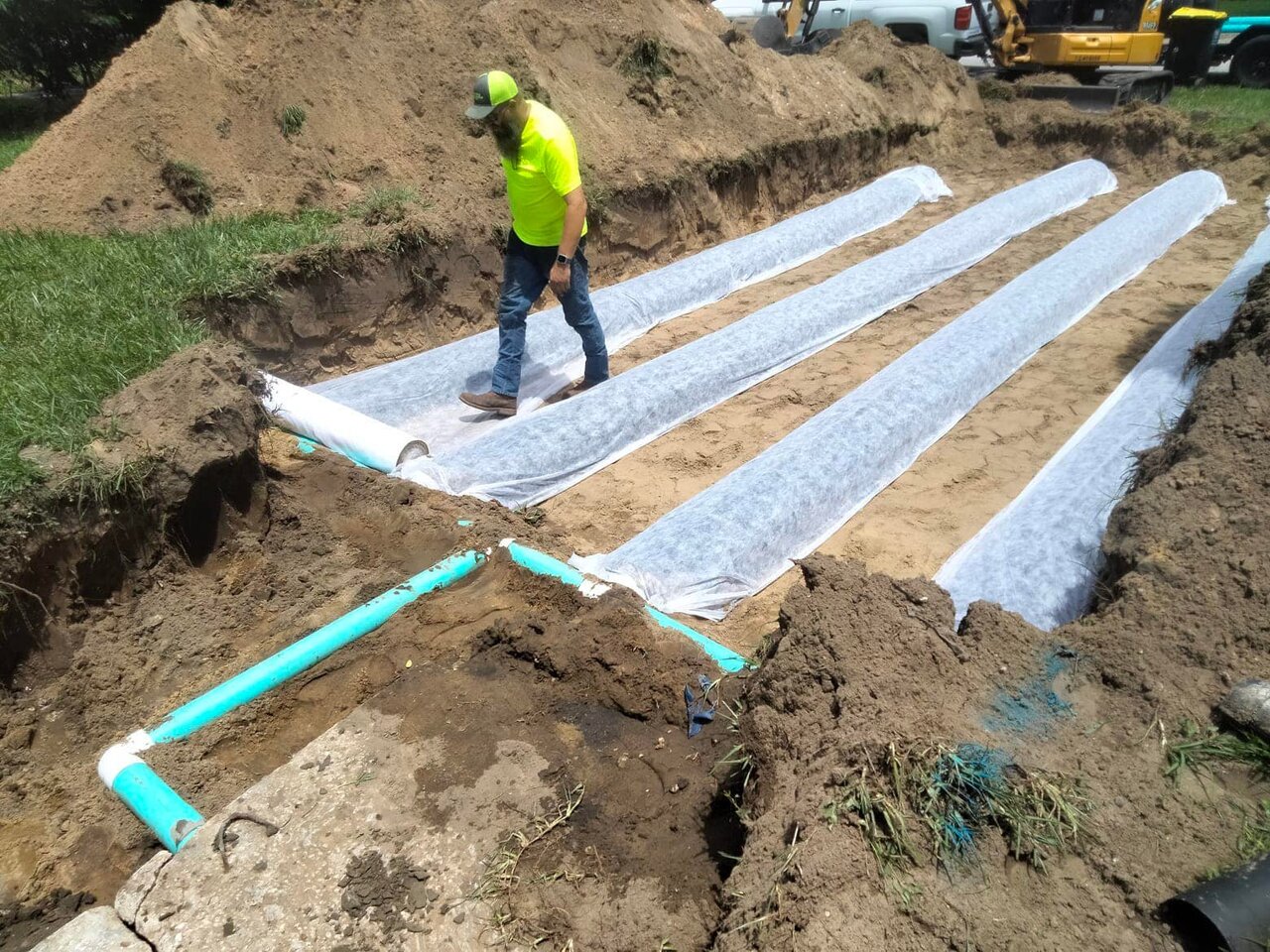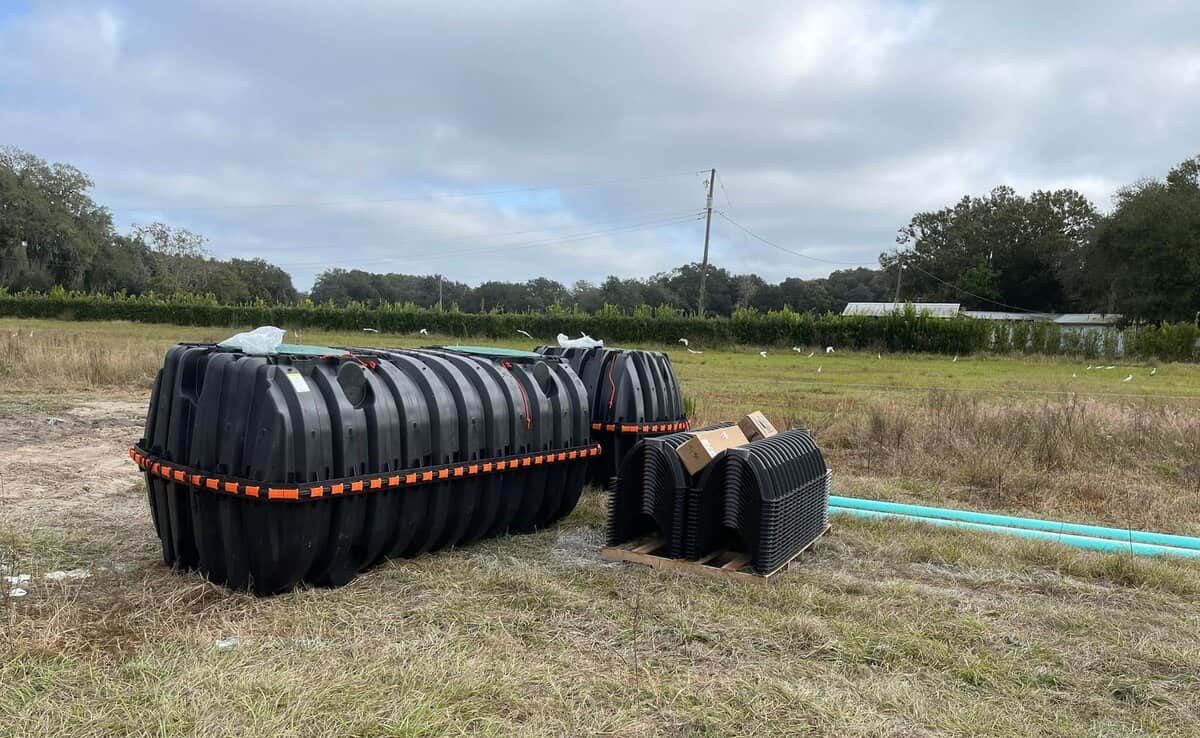According to the United States Environmental Protection Agency, approximately 20% of homes in the country rely on individual septic systems or community septic systems to process their wastewater. The agency notes that the distribution ranges from about 55 percent of homes in Vermont to approximately 10 percent in California.
How Does a Septic System Process Wastewater?
Septic systems are designed to remove contaminants from household wastewater before it is discharged into the environment. The septic system accomplishes this by using a combination of physical, chemical, and biological processes.
The septic system’s tank is the first step in the process. It is typically made of concrete, fiberglass, or plastic, and it is buried underground. The septic tank holds the wastewater long enough to allow solids to settle out of the liquid. This process is called sedimentation.
The settled solids are then broken down by bacteria. The tank also provides anaerobic conditions (conditions without oxygen) that are necessary for this process.
The septic tank effluent (liquid waste that has been treated in the septic tank) then flows through a septic drain field. This soil absorption field is a network of perforated pipes that are buried in gravel-filled trenches. The effluent seeps out of the pipes and is absorbed by the surrounding soil.
The soil further filters out pollutants and disperses the treated effluent. The septic system effluent is eventually discharged into groundwater.
What is the Potential Septic Tank Environmental Impact?
Septic tanks can be good for the environment if they are properly designed, installed, and maintained. Septic tanks can provide a number of environmental benefits, including:
- Reducing the amount of sewage that is discharged into surface water bodies
- Reducing the amount of sewage that is treated at sewage treatment plants
- Reducing the amount of energy that is consumed to treat sewage
- Reducing the emission of greenhouse gases from sewage treatment processes
However, septic systems can have a number of potential negative environmental impacts if they are not properly designed, installed, or maintained. These impacts include:
– Groundwater pollution
– Surface water pollution
– Soil contamination
– Odors
– Nuisance algae growth

Groundwater Pollution
Septic systems that are not properly designed, installed, or maintained can allow pollutants to seep into groundwater. Groundwater is the water that saturates the soil and rock beneath our feet. It is a major source of drinking water for many people.
Septic systems that pollute groundwater can contaminate private wells and public water supplies. Pollutants that may be present in septic system effluent include bacteria, viruses, nutrients, and chemicals.
Surface Water Pollution
Septic systems can also pollute surface water bodies, such as lakes, rivers, and streams. Surface water pollution can occur when septic system effluent seeps into surface water or when septic tanks are located too close to surface water bodies.
Soil Contamination
Septic system effluent can also contaminate soil. Soil contamination can occur when septic tank effluent seeps into the soil or when septic tanks are located too close to the soil surface.
Odors
Septic systems can produce odors if they are not properly designed, installed, or maintained. Odors can be caused by sewage gases that escape from septic tanks or by septic tank effluent that seeps into the soil.
Nuisance Algae Growth
Septic systems can also contribute to nuisance algae growth in surface water bodies. Nutrients in septic system effluent can promote the growth of algae and other aquatic plants. Nuisance algae growth can cause a number of problems, including:
- Reduced dissolved oxygen levels in the water
- Changes in the aquatic food web
- Tastes and odors in drinking water
- Clogging of intake screens at water treatment facilities

How Are Septic Systems Regulated?
Septic systems are regulated by the Environmental Protection Agency (EPA). The EPA has set national standards for septic system design and operation. States and local governments may have additional requirements.
The main federal regulation governing septic systems is the Clean Water Act. This law requires septic systems to be designed and operated in a way that protects public health and the environment.
Septic systems are also subject to state and local laws and regulations. For example, some states require septic tanks to be inspected every three to five years.
Septic Systems and the Environment
Responsible septic system usage has little to no negative impact on the environment. In fact, septic systems can actually be beneficial to the environment when compared to other waste management options.
Septic tanks are highly regulated in order to protect public health and water quality. Stringent regulations ensure that septic tanks are operated and maintained correctly, preventing any potential environmental problems.
Proper precautions and regular maintenance can help ensure that they do not pose a risk to the environment or to public health.
Here are a few tips:
- Regular septic tank pumping can help ensure that your septic system functions effectively.
- Follow guidelines for proper in-home septic system care, including only flushing waste and septic-safe toilet paper, and using water conservatively.
- Be aware of how to care for the drain field. Do not park or drive on it, or plant vegetation like trees with long roots near it.
Contact a septic professional at the first sign of any trouble, since seemingly small problems can quickly become much larger.
Septic Service In & Near Lakeland
When you need a septic company in & near Lakeland, contact Septic and Drainfield Depot. We offer a full range of commercial and residential septic services throughout central Florida.
Our team of septic professionals has years of training and experience, making us the best choice for installing, inspecting, and maintaining your septic system.
Whether you need routine septic service like septic tank pumping or you need to have a whole new septic system installed, Septic and Drainfield Depot is here to help.
Contact us today for a free evaluation and estimate.







